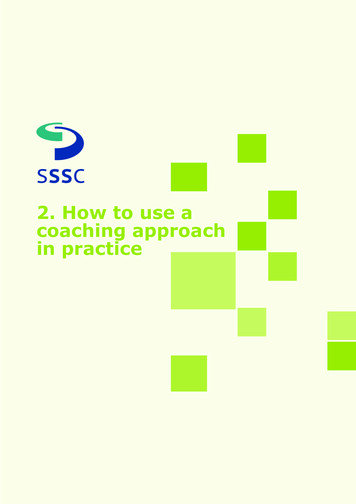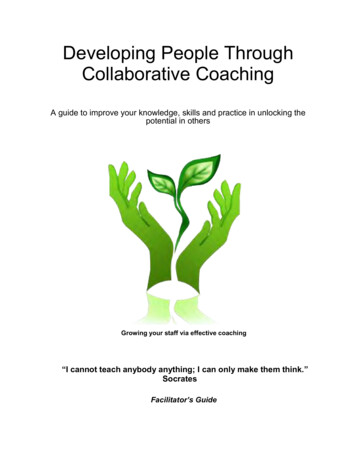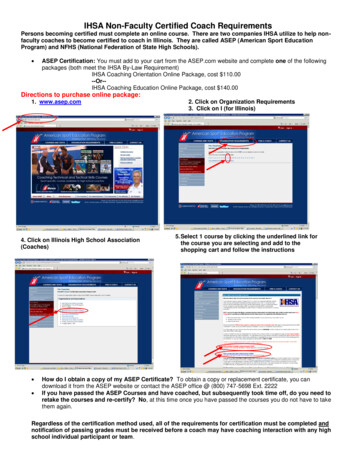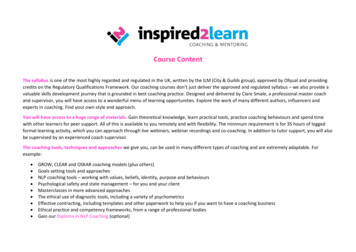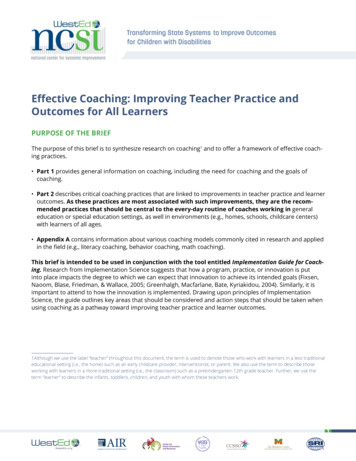
Transcription
Coaching for Performance:A Conversation with Sir John WhitmoreInterview Conducted by Agnes MuraThis article first appeared in the International Journal of Coaching in Organizations, 2003, 1(4),107-116.It can only be reprinted and distributed with prior written permission from Professional CoachingPublications, Inc. (PCPI). Email John Lazar at john@ijco.info for such permission.Journal com2003ISSN 1553-3735 Copyright 2003 PCPI.All rights reserved worldwide.
Coaching for PerformanceA Conversation with Sir John WhitmoreInterview Conducted by Agnes Mura“In a one-to-one, person to person context, we help people develop themselves and their own sets of personal values, and therecouldn’t be anything more direct than that. So I believe that coaching people is service to the individual but it is also serviceto getting this planet well.”A.M.: Too young to settle for what’s easy A.M.: Your foundational and widely read book,“Coaching For Performance” is in its third edition. Themost significant addition this time is, I think, the aspectof coaching for purpose and meaning. What did yousee in organizations today that made you think “there’sa key coaching aspect missing that we need to add tothe book”?J.W.: Too young to settle down too much, too. I thinkperhaps the wisest decision I ever made in my life, wasthe recognition that I had to look inside not outside. Soinstead of buying more businesses or more airplanes ormore cars or more houses in the Caribbean or somethinglike this, as many rich people do, I thought, “No, I haveto look inside.” It’s not more, not quantity but quality.And so I went to the Esalen Institute in California in1970 when no one from England had been there. Thiswas completely crazy, I’d read about it in Time magazinewhich said this is a very subversive place and a verybad thing! So I went there not knowing what to expectat all. What I found was the birth of HumanisticPsychology as opposed to the traditional, behavioral,cognitive psychology, on which sports coaching hadbeen based in the past, because sports coaching was notreally coaching at all, it was instruction, based incognitive and behavioral modification principles. Sohere was something very different, and I got immersedin that process: turns out we have emotions that areallowed to be there, and all these exciting things, thatweren’t even considered before. But having thebackground in sports, I was always looking for someapplications of this.J.W.: It rather came the other way around, because whenI started coaching originally with the Inner Game, whenI was first trained by Tim Gallway and began to developa bigger picture about what was behind coaching, I wasalready looking to see how we could accelerate theevolution. But what I didn’t want to do is to go too farin the first editions of the book, because it was so allnew that I didn’t want to turn people off. As soon as thenext door opened, then we walked on. I have beentraveling on a progression, and I even wanted to gofurther than my publisher, but he said “now wait aminute, little careful here, hold back a little bit more.”A.M.: Maybe we can follow your trajectory a little moreclearly then. People in the coaching profession knowyour book very well, especially this journal’sconstituencies – executive coaches, corporate coaches,coaches working in organizations both in the US andabroad. But in the United States, we knew little aboutyou before its publication. I was fascinated to find outabout your race car driving youth and then yourinvolvement in business, in sports and in the InnerGame. There is always great interest in understandingyour multi-disciplinary roots as a coach, so typical formany of us.A.M.: So how do you think developmental coachingtranscended sports coaching? And then we can talkabout other roots that have informed your coachingphilosophy.J.W: I met very early on with Bob Kriegel who was theco-author of the Inner Skiing book later; but this wasfour years before he wrote that book. He’s written abook called “If it Ain’t Broke, Break It!” and alsosomething called the “C-Zone” or something like that.But anyway, he was a skier and I was a skier also, so wewere talking about how we could apply this in sports,and then from that I met Tim Gallway, and suddenly Icould see the relationship between humanistic psychologyand performance. And so I was very excited by that andJ.W.: The sports route is an interesting one, my firstlifetime was in professional sports, and then I had ashort second lifetime running businesses, I had threebusinesses. I began to feel there was something more tolife than just running a business. That was just materialsuccess and I had already satisfied my ego in sports, asuccessful business, and now where is there to go fromhere?107 Copyright 2003 by Agnes Mura. Used with permission. All rights reserved worldwide.
The International Journal of Coaching in OrganizationsI trained with Tim and, under license, I started the InnerGame organization in England, which in the firstinstance was not a business at all, it was a ski schooland a tennis school, and that was all I was interestedin. Very quickly, business people who came on our skicourses recognized how valuable this could be forbusiness, and so they kept asking us: “can you dosomething with our HR people?” and that sort of thing.A.M.: Okay, let’s stop there for a second. What do youthink they saw? What was that essential component?J.W.: I think what they saw was something more realthan what they’d done before. I think ourunderstanding of human beings is still very much in itsinfancy; psychology is a new science. And so you havethe first wave of psychology which was around Freud,then you had Watson and Skinner with theirbehaviorism and then the next wave is HumanisticPsychology. And so each wave is kind of a deeperunderstanding of how human beings work, and so eachone takes us a bit closer to what is human nature. Wehave a long way to go but at least one has moreunderstanding. And when people come in contact withthis work, they generally feel that there is a ring of truthhere.A.M.: If they notice that it’s truly shifting them J.W.: Yes, at a deep level, they relate to it, and I think itmakes sense. They feel comfortable, they feel at homewith it, this makes sense. I had a lot of people say to methat they were reading “The Inner Game of Tennis”and they were saying ‘yes, yes, yes’, and they said “Icould’ve written that book.” So I think what we weredoing made such obvious sense and it was all aboutimproving performance.A.M.: It was about improving performance in a moreorganic, natural way J.W.:Yeah, and business is very much aboutperformance, so that’s what they’re looking for. Theycould see it work when we were on the tennis court –“get this to work in my business and I’ll be successful!”So I moved into business and I still kept the ski schoolbecause I enjoyed my skiing and I love teaching skiingand then eventually I had to let that go and focusedentirely on the business world. I then met up with mytwo current colleagues, David Whitaker and DavidHemery, both Olympic gold medalists. The three of uswere very concerned about how badly coaching wasdone in sports. They didn’t really know what thesolution was but they knew there was a problem. So inour conversations, we felt that very clearly that this wasthe way forward. So we started working, initially to tryto persuade the sports governing bodies in England tochange their method of coaching. That was very hardwork and A.M.: not too successful?J.W.: They are very conservative, very, very conservative.I don’t like pushing at a door that is closed. So wefound what you were saying earlier, that now coachingin business is about 15 to 20 years ahead of coaching insports.A.M.: Right, right. When I teach coaching, I emphasizethe distinction between performance coaching and whatpeople see as sports coaching, because when managersonly relate “coaching” to sports, they areunderestimating and misunderstanding our profession.J.W.: Well, absolutely. Because if they have had someexperience of coaching in sports for themselves, thenthey probably had a bad experience.A.M.: And they say, “The coach doesn’t consult withthe players before he calls the play!”J.W.: Yeah, that’s right, he doesn’t. So we just moved inthe direction where the doors were open A.M.: Right. So “Coaching for Performance” was bornof the transfer of the tools and approaches of humanisticpsychology as used in sports to the world oforganizations. That’s why it made sense to even borrowthe term ‘coaching.’J.W.: Remember, when we started the Inner Gameorganization in the UK, we were completely unique; wewere the only people in England doing anything likethis; the only people in England applying humanisticpsychological principles outside therapy. I was one ofthe first Englishman to go to Esalen.A.M.: I bet.J.W.: But quite early on we recognized that there was aproblem with the name, the Inner Game, because itsounded like some sort of American cult, somethinglimited. So we wanted to use a generic term thatdescribed it more broadly, and that’s why we chose theword ‘coaching.’ In hindsight, I wonder if it might nothave been better to invent a new word, because youdon’t have the baggage or a narrow definition of whatit had meant to people before.A.M.: I think we’re getting around that handicap veryfast, and I think the business coaching context hasbroadened the concept of coaching immensely.108
2003 Annual Edition (Issue Four)J.W.: Yes.J.W.: Well, when we started in England, we had 6 or 8people who trained with Tim Gallway, and when westopped the Inner Game company itself, we all wentinto business, but not all working together. So nowwe’re about four or six different organizations, all doingInner Game coaching in business, but all of us used theterm coaching because we all wanted to drop the nameInner Game. It was not any kind of negative break-upthat we went in different directions, we were all friends,but I wanted to keep skiing, and others pursued theirown interests.J.W.: Yes, I think Germany has been a bit slower tochange. In Scandinavia for example, or Holland orEngland it probably started about 10 years ago. So thecultural factors were one reason for the difference. Thereis another thing, too. We did not start out by coachingprivate individuals first. The way we all worked wasteaching managers to manage using the principles andin the style of coaching. So the coaching throughoutEurope has integrated coaching much deeper withinmanagement behavior. Although we do now haveexecutive coaching, and certain specialized peoplewithin organizations who may have acquired specialcoaching skills, much of the work we do is still changingthe management style, the management culture of theorganization by integrating coaching. So theorganizations that bring us in are often looking forculture change.A.M.: How much did you follow what was occurringin the States?A.M.:You do that by training broad layers ofmanagement.J.W.: Tim also began quite early to work in business buthe worked in a different way. He worked more with thetop executives and so on. The development of coachingin Europe and in America went in two differentdirections.J.W.: But not very deep training, because the two to sixdays we offer are just sufficient for them to start usingthis behavior in their management behavior but notsufficient for them to become a great coach.A.M.: Is it your sense that you were the first one to usethe word coaching in this meaning? Who else were youaware of working in this vein 10-15 years ago?A.M.: Say more about that.J.W.: The reason for that is that it really started in theUSA around Life Coaching, that’s what I feel.A.M.: Let’s say the expansion of coaching into more of amass phenomenon certainly began with personalcoaching.J.W.: There is an explicit reason for that; in Americapeople were quite comfortable with talking about theirpsychoanalyst years ago and then about their psyche.They also could afford to pay these people to come andwork with them. In England, we’re much more reluctantto talk about any kind of emotional needs in that way.An English person would be very embarrassed to talkabout their analyst. There was that problem but also,we also have socialized medicine, so people expect freeservice. So the profession of coaching couldn’t growthe same way, because people were just not accustomed,they didn’t have the expendable money and there werenot accustomed to pay to take care of a personal needlike that.A.M.: Of course.J.W.: But that is what we prefer to do and I think it has amuch bigger impact than individual coaching. Becausewhat they are trying to do is really change the culture.Now England is much more compressed in the sensethat communication is much easier. So with five of ourorganizations doing this kind of thing A.M.: There was a big impact.J.W.: The influence was substantial. Not only inEngland, but my book was translated into severallanguages quite early and is now in 14 or 15 languages.So the same thing began to happen in Europe, and notjust our organization “Performance Consultants”, butthe group of people who were involved with the InnerGame in the beginning really have influenced the wholeof the way coaching developed in all of Europe. I stillargue a little bit with Tim Gallway because he uses morethe American approach, as one would expect.A.M.: So in America in a sense there have been twothings happening. On the one hand there is massavailability of personal coaches who do telephone work,A.M.: So there was the health system and there was the and who were trained in programs like the ones Thomasculturally perceived stigma. I did some work in Germany Leonard initiated, like CoachU. And even the roots ofwith some senior banking executives and I had to go to the International Coach Federation ultimately go backtheir home and write to their private emails when I did to personal coaches. And then separately at the top ofassessments or coaching sessions with them. It was very organizations executive coaching started being morehush-hush, even four or five years ago.overtly and widely used, particularly in the last ten years109
The International Journal of Coaching in Organizationsduring the ‘war for talent’. It became harder formanagement to dismiss people who had a flaw or whowere not growing fast enough for the new challenges,but who were otherwise high performers. So they startedinvesting a few thousand dollars in an executive coachto salvage or accelerate the growth of key contributors.At times, I see the pendulum swing in the States inaccordance to economic cycles. When business is slow,people get dismissed more easily and we see moredemand for reactive, remedial coaching. When thingsare good, there is much more proactive leadershipdevelopment of entire senior teams, there is much moreindividual and team coaching.J.W.: That’s interesting. I think in England the amountof work we get goes up and down according to theeconomy, which is just based on how much trainingthey can afford, it doesn’t change in nature. But I alsothink that there’s influence both ways, because I thinkthat life coaching is getting more accepted in England,people are more open to acknowledge that they can usethis, there’s not such a stigma. That’s true also forexecutive coaching, it’s quite a big thing now!A.M.: So we have personal coaching, executive coachingand that high-leverage piece in the middle: managementtraining in coaching skills, which is how coaching canbecome the key dialogue and feedback modality of theorganization.J.W.: And that is happening more in the States nowalso. IBM has used my book for five years; as a mobileorganization they have an online training system. Theyhave a simulator where the staff can go throughcoaching exercises online. After they’ve done this,there’s work to complete properly, then they all go toAtlanta to the training headquarters of IBM for a week:½ day on coaching, ½ day on teams, ½ day onleadership, etc. but they’ve done their pre-work on thesimulators. The fact that it’s been five years since IBMhas been doing this is a good indication, for example,that they are looking to integrate coaching into themanagement culture of their organization. I think thatthe boundaries that existed between the UK and the USare blurring. As I said, Tim Gallway and I have sort of afriendly debates about the difference in perceptionbetween management and coaching. And there isobviously a convergence as time goes on.A.M.: So let’s go back to why it was particularly timelynow for you to add these issues of personal purpose,meaning, corporate values, culture in this edition?came on to the scene almost in parallel to humanisticpsychology. The leading transpersonal psychologistslike Carl Jung and Roberto Assagioli actually startedbefore the humanistic psychologists.A.M.: But they weren’t actually publicly accepted.J.W.: The public wasn’t ready yet. The public was moreready for humanistic psychology and so that had tocome first and then transpersonal psychology built onthat.That was an obvious and rather naturalprogression. It was a question just when do weintroduce the transpersonal principles. Anyway, andmy wife, whom you met, has the biggest training schoolfor Psychosynthesis in England. She did that for 22years; she and I both knew Roberto Assagioli before hedied. For us that was a very familiar territory, but justwhen do we introduce it? It was too soon for the 2ndedition but not too soon for the 3rd. What we also noticedis that when we did practice-coaching exercises withpeople in groups and they brought up what theywanted to be coached on, we were noticing,increasingly, that people had concerns about meaningand purpose in their life. In the past, they would getcoaching from one of their colleagues on companymatters, but they couldn’t touch on meaning andpurpose when it might have possibly meant they mayhave to leave their company because they find their workmeaningless or unsuited for them. They were, however,happy to have the opportunity to speak with us as anexternal facilitator about these topics. I thought thiswas interesting: people seemed ready for this. Of course,if you are going to be a coach, you need additional levelof skills if you are going to get into these areas.A.M.: And that’s why external coaching and executivecoaching is catching on so much, because there is alimit to what you can discuss even with an internalcoach, who is an HR professional.J.W.: Although I have to say that there are twocompanies, both relatively small companies, that I amworking with at the moment. One of them is a restaurantchain, so not that small, but we are working at thistranspersonal level from the board right into the wholeorganization.A.M.: Are you doing the coaching?J.W.: No, we are training them to begin using some ofthese processes themselves. Well, then we get to thenext point. When you want to develop your ability as acoach or indeed a coach-manager, how much of thisJ.W.: It is a convergence of the external need and my can be accomplished by training people in coachinginternal sense of progression. So, talking of personal behavior methods, and how much of this is about theirpurpose first: the next step beyond humanistic own “stuff”? There is a substantial personalpsychology is transpersonal psychology, which sort of development requirement at this stage. What do you110
2003 Annual Edition (Issue Four)need to be a good coach? Well, you need above all todeal with your personal development, otherwise there’sa limit to the depths you can reach with the colleagueyou are coaching.A.M.: Some manager-coaches are seeing their coachtraining as the transformative process it is. It’s not aboutwhat they are doing for their staff but who they arebecoming.J.W.: There’s another thing too, when you start lookingat meaning and purpose, one question is, “What doesmy work give me?” If I’m doing a job from which I canderive a sense of self-worth and self-belief then my beingthere has meaning, because it’s developing me. But at acertain point, I’m going to look outside that and say,well, my activity on a day to day basis is merely readingsome signals on a screen or pushing paper across desksto other people. That in itself doesn’t have any greatvalue but if they have to do that to produce service, thenit does. My next question then is: “am I happy with theservice or the product that my company is producing?”And clearly there are some activities people are happywith because they feel they’re doing good, and otherswho may feel “this is an activity that makes a lot ofmoney, but I don’t feel very good about it, because it’snot very ethical or it’s not useful.” And more and moreof people are beginning to question the values of thecompany they’re working for. And that comes upbecause meaning and purpose come up, so there’s arelationship between meaning, purpose, value and ethics.At the same time, we are in the middle of a corporatecrime wave. And I’m not saying that corporate crime isdramatically worse than it was before, but moreinformation is available through the Internet. Peoplebefore did not have the courage to complain aboutcorporate crime because they wanted to keep their jobsand now there is much more public exposure. Thereforepeople are recognizing a degree of corporate crime that’slargely been there, but they hadn’t known how bad itwas. A lot of eye-opening stuff. But under the Bushadministration public discourse is actuallydiminishing. Democrats don’t even dare say ‘boo’ toRepublicans now. We shouldn’t go there As aEuropean I’m just horrified by what I’m seeing overhere.A.M.: And that’s not a values conflict, it’s truly findingmeaning in your own activity. Do you think that we’redoing a reasonably good job as coaches in improvingthe emotional intelligence level in organizations? I don’tknow how much in touch you are with coaches ingeneral, whether you interact or go to conferences J.W.: I’m co-chair of the European Mentoring andCoaching Council which is looking Europe wide atproviding some sets of standards, but not to police themas such.A.M.: Is that analogous to the ICF?J.W.: ICF itself is likely to become a member of thiseventually bigger organization, which is not to try toundermine the ICF but to be very broad and to include alot of things that maybe ICF does not include, likecoaching schools or application of coaching A.M.: But you’re also looking that this organization willcertify people and such?J.W.: No, it would look at other certification programsand make some suggestions saying that you are a littlebit out of line, etc.A.M.: So it’s more like accrediting the traininginstitutions J.W.: It’s not saying you’re bad if you don’t do it, it’sjust making recommendations more than anything else.We’re looking more for collaborative relationships.A.M.: So in that context, how do you think we’re doing?J.W.: One thing that impressed me recently at a meetingwe had on standards of this group was the degree ofcooperation. We invited quite a large group of peoplebecause they were coming to a conference the next dayof one of the organizations. So we had about 70organizations represented there, it was incredible andthere was no conflict there the whole day. Theoretically,these were competitive organizations with each otherbut we were all looking to collaborate and there was ahigh level of agreement to what we were doing. We allshared disappointment that we are not having more ofan impact on the corporate world. I mean, we’re clearlyA.M.: You mean the conformity of thinking?having an impact but you’re never satisfied, there’salways more. Because of the obvious pressures of theirJ.W.: The conformity of thinking and the unwillingnessmonthly figures – I mean we are focused on the humanof people to challenge a corrupt establishment. I thinkside and they have a lot of other things they have to takeone of the benefits of coaching is getting people more incare of. We would like to have them pay much moretouch with themselves and their inner standards andattention to the human side.therefore enable them to be more critical of unethicalA.M.: Well, for those of us who speak direct tobehavior.corporations try to make the argument that the two areinextricably connected 111
The International Journal of Coaching in OrganizationsJ.W.: But the trouble is the time frame “Well, I have toget my figures right this month ” The impact that weare having is that they see more long-term.A.M.: What I’m seeing with my coaching clients thatburn-out is becoming, at least in the United States, ahuge problem. A lot of the productivity that’s beingsqueezed out of organizations comes in part fromtechnology but it also comes out of just increasedproductivity from individual people through extrahours. I find that I have to coach people just to stayalive, survive, keep your performance up, day in dayout, under such extraordinary pressures for many years,as the analogy of athletes running Olympics all the time.So those pressures are enormous, so the only way wecan bring in coaching is to say to the organization isthat we’re hoping people become more efficient and inaddition more effective because the demands are soenormous.J.W.: In a coaching organization, when I look at it moreat the integration coaching as a manager, one of theadvantages that accompanies is that they keep theirstaff better, because they want to stay, they want to bean organization that respects personal development andgives them opportunities, etc. Many of our clients havesaid themselves that their staff turnover has improved.A.M.: Do you think we are also improving the emotionalintelligence level in organizations? Are we facilitatingnew philosophical and spiritual perspectives inorganizational life?J.W.: That’s what I call the transpersonal dimension.First of all, I don’t think there’s any magic in emotionalintelligence in the sense that when I was in Esalen in1970 that was what we were doing. And we knew thenthat at some time in the future this was going toreverberate in society beyond some retreat on the BigSur coast. I sometimes describe EI as simply theunderlying “being” behind the “doing” of coaching.The doing is the behavior - asking questions - and thebeing is where you come from; and that is emotionalintelligence.right-wing approaches to utilizing religion, but I thinkthey’re very dangerous. The fact is that most people arebeginning to look for meaning and purpose whereverthey spend their time, in sports or in recreation or intheir work place, way beyond religious practices A.M.: They’re looking for avenues for creating meaningwithout obtaining it from an external source. That’s whatreligion used to do for you – it defined who you are.Because most external sources of “truth” are in question,we are forced to provide some for ourselves, which is abit of a post-modern “aha.”J.W.: With the possible exception that behind allreligions, there are some common pictures of how theuniverse works. There are models if you like, which arenot dogmatic and ritualized like the religions, but theyare models of the sort of evolutionary journey of humanexistence that are consistent in a spiritual sense.A.M.: And they translate into values that a lot of peoplewould agree on.J.W.: Yes, they are the common ground. So I’m sayingthat our values aren’t entirely self-created. I would saythat the best transpersonal coaches do have some mapsand models. Now they don’t impose those maps andmodels but it certainly helps, as a coach, to understandsomething about the evolutionary journey. If’ I’m anordinary surface level coach and I’m coaching you toperform a task well today, I can look at that purely interms of my frame of reference about the task. Or I cantry to develop this person so they can not only performthis task but other tasks in the future. Or I can go yetanother step and say: “here is a person on a life journeyand here is a life obstacle to overcome as part of theirlearning process on their journey.” It’s about getting alittle bit further behind that and having a bigger visionof the person sitting in front of me. My feeling is that thebest coaches are those who are in this position and havethis big vision.But I do think we do get close to other types of counselingor therapy in some places here because there are signalsthat people are giving, that if you have sometranspersonal, spiritual knowledge you canimmediately recognize patterns and see where thisperson might be operating from. I’m not saying that acoach wouldn’t get there in the end anyway, but youcan save a lot of time and energy if you have broaderunderstanding.But spiritual intelligence, as an avenue for dealing withmeaning and purpose is very important. In a sense, ifyou look at the books that have the world spiritual intheir title - like The Spiritual Audit of Corporate America isone, or Danah Zohar’s book (editor’s note: SAM:Connecting with Our Spiritual Intelligence) - all of themdefine very quickly, that they’re not about religion, but For example, an ordinary coach – let me be a bit unfairabout meaning and purpose. Religion’s original - perhaps quite a competent coach, might see somebodyfunction was to provide a sense of meaning and purpose who is stretched at work. Their exploration work mayto people. In our secularized society, that no longer be around too much work, prioritizing, delegation, etc.happens in the same way. I won’t get into some of the Stress, though, is very often a signal of lack of meaning112
2003 Annual Edition (Issue Four)and purpose. But you would have to recognize that tomove beyond just trying to help them prioritize.A.M.: It almost feels like there is this level between justefficiency coaching and before it becomes a spiritualissue: the issue also has a psychological aspect, becausepeople have a choice to interpret what happens aroundthem in a way that stresses them, and th
Coaching for Performance A Conversation with Sir John Whitmore Interview Conducted by Agnes Mura “In a one-to-one, person to person context, we help people develop themselves and their own sets of personal values, and there couldn’t be anything more direct than that. So I believe that coaching people is service to the individual but it is .Author: A. Mura

